Dementia – Selecting suitable activities
Introduction
Dementia is caused by pathological changes in the brain cells. This degenerative brain syndrome affects one's memory, attention, calculation, language, perception, judgment, problem-solving and executive function, etc. Suitable activities for patients with dementia help delay their physical and cognitive decline, enhance their quality of life, improve their relationship with caregivers and relieve caring stress.
Activities are common treatment modalities for patients with dementia. They can be in the form of individual, small group and large group. Any group formed with two or more persons having the same treatment goal which may bring out group dynamics, is considered as an activity group. Through careful planning of meaningful and purposeful activities for patients with dementia, their physical, cognitive, social and functional abilities can be improved. They may also gain a sense of satisfaction and fulfillment of life.
“Individual training”: more suitable for patients with poor attention and those in the late stage of dementia, on a “one-to-one” basis.
“Small group activities”: usually consist of two to eight elderly people having a similar level of cognitive ability and participating in activities with the same specific treatment goal(s).
“Large group activities”: usually consist of more than eight elderly people. Examples are birthday parties, festive celebrations, volunteer visits and watching performances, etc.
Types of Activities
Below are the common training activities for dementia patients:
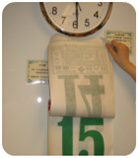 |
Reality Orientation
|
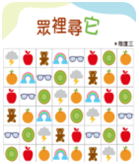 |
Cognitive training:
|
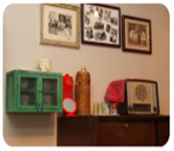 |
Reminiscence:
|
 |
Self-care activities
|
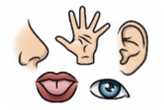 |
Multi-sensory stimulation
|
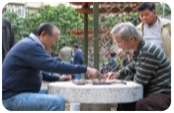 |
Social activities
|
Planning and organising activities – tips
Flow:
- Mainly divided into introduction, theme activity and summary, total 30 to 45 minutes.
- Reality orientation: 3 minutes + theme activity: 25 minutes + summary: 2 minutes.
Time:
- Fixed time – morning/after nap is preferred. The duration can be adjusted according to the patient's concentration.
Location:
- Choose a comfortable, safe and quiet environment (turn off the TV and radio).
Design:
- Consider the interests and abilities of the elderly people - cognitive function, physical function, vision, hearing, appropriate level of difficulty, and provide guidance/demonstration gradually.
- Design activity based on the principles of meaningful, no frustration, safe and low risk.
People oriented:
- Design activities according to personal needs, strengths, skills, abilities and interests.
Activities preparation:
- Utilise daily objects that patients are familiar with, such as calendar, clock, fruits, bowl, towel and mirror, etc. which can strengthen their cognitive ability and apply in the daily life.
- The use of tools can be flexible, for example: use a small towel instead of a ball to play music ball games or do towel exercises. Avoid activities that involve vigorous movements and/ use of small sized materials and sharp tools.
Activities guideline:
- Lead the activities flexibly. Adjust the activity content, materials and format according to the ability of the elderly people.
- The frequency, difficulty and duration of activities can be adjusted progressively (for example, whether the activities require more planning and organisation, judgment).
- The most important thing is to allow them to participate as much as possible by giving appropriate assistance according to the elderly people's ability. Provide verbal cues/body language as guidance when necessary to promote self- imitativeness and satisfaction of patients.
Related Audiovisual and Booklet Package(s):
Practical Tips for Carers - Dementia Care
Practical Tips on the Carers of Elders with Moderate to Severe Dementia - Dementia Care II
